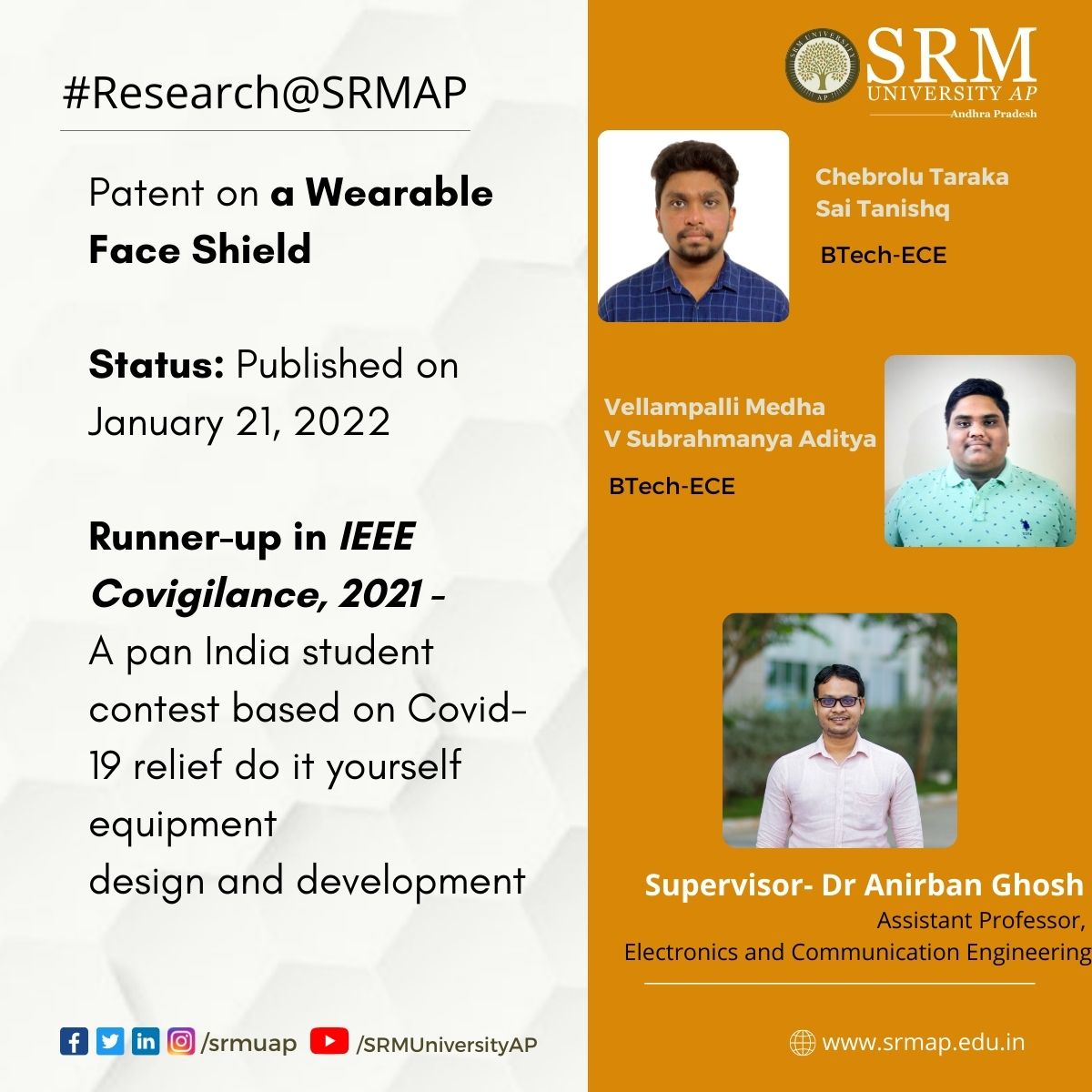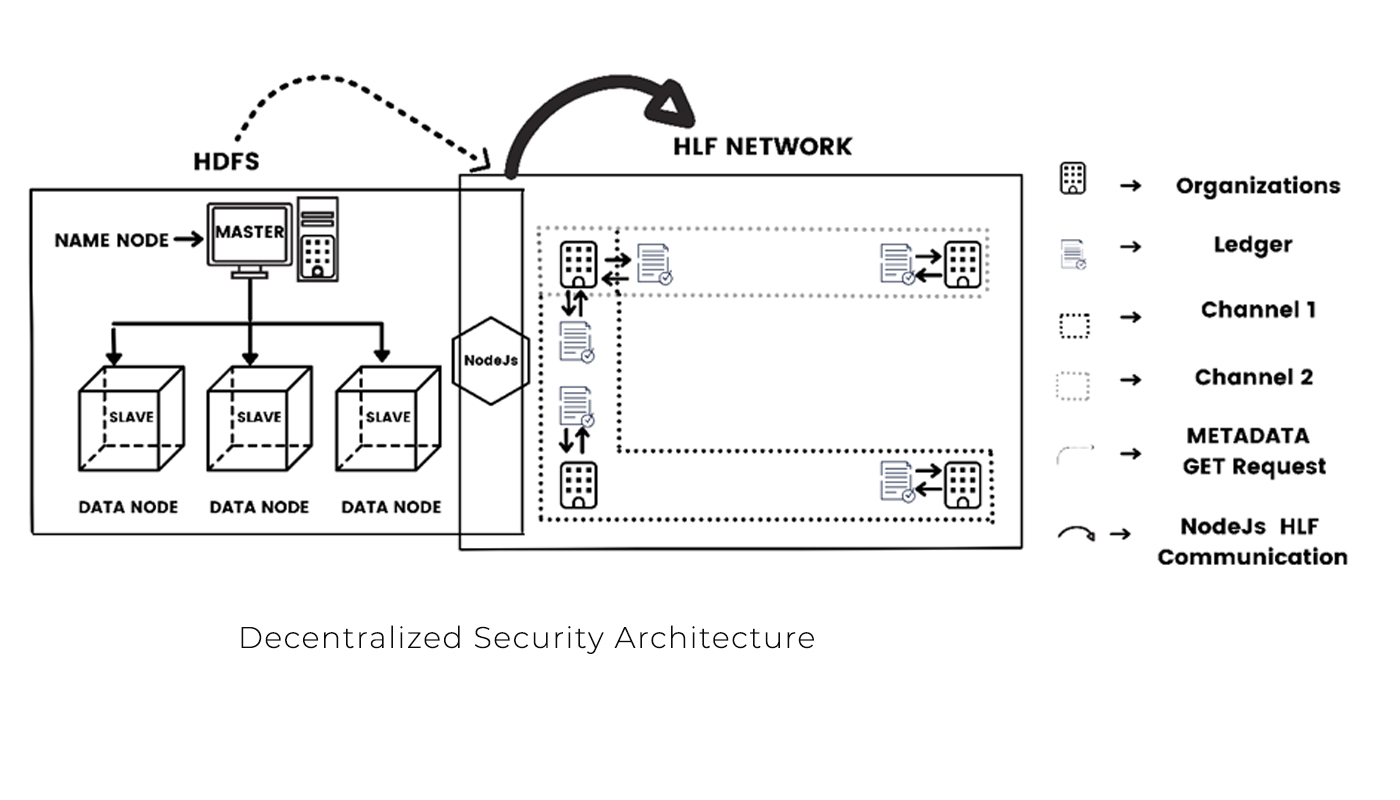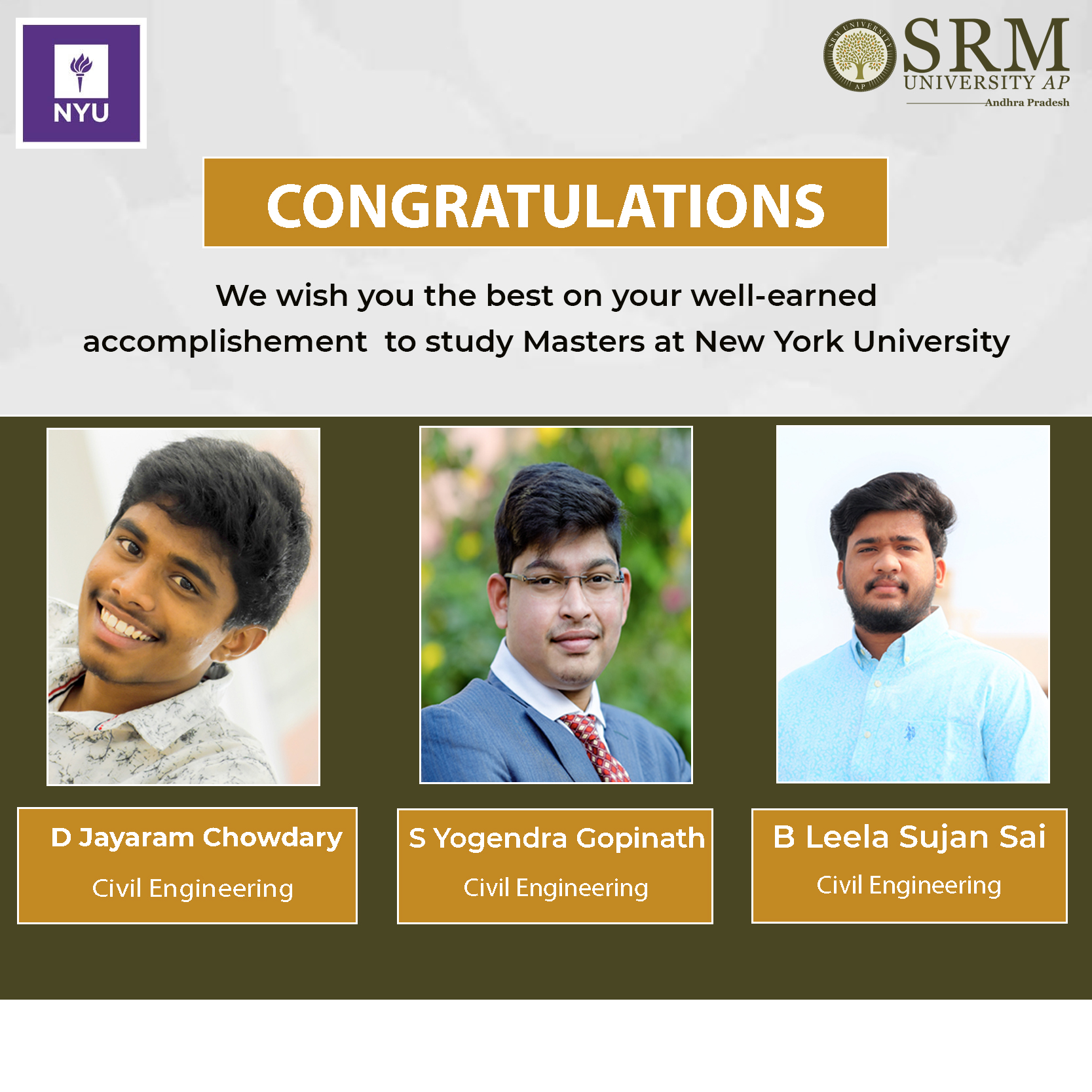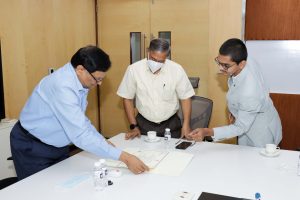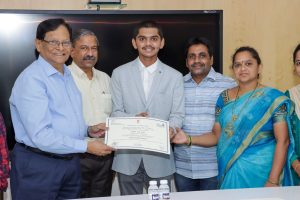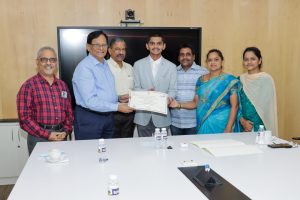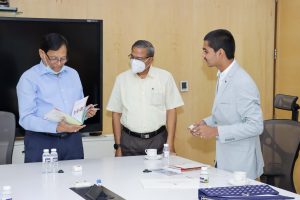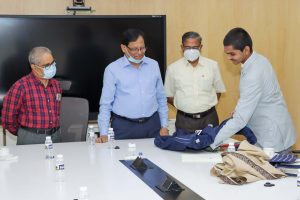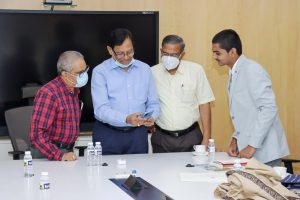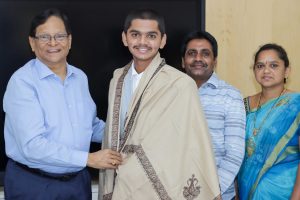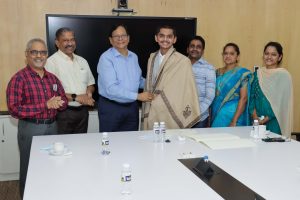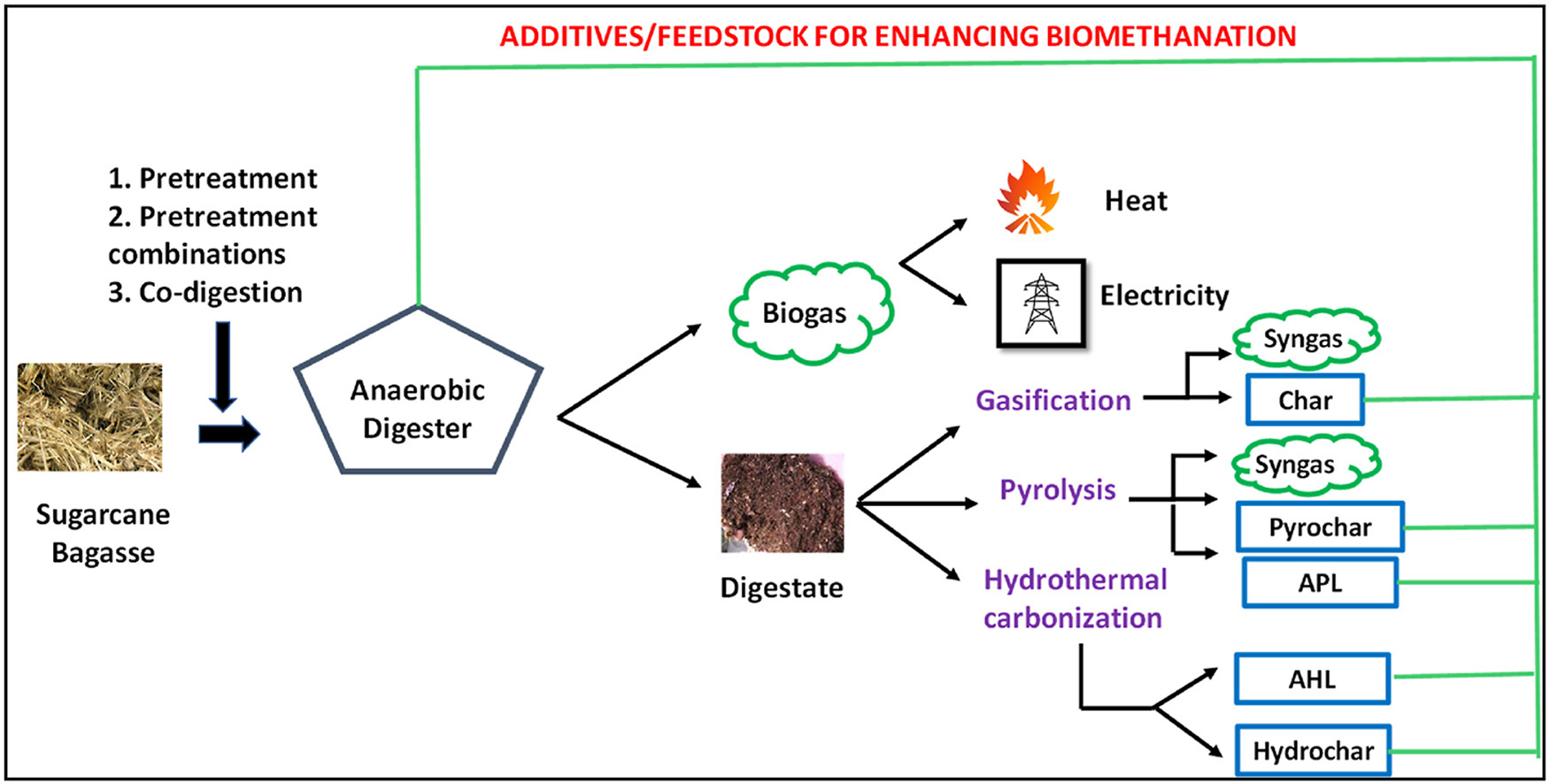Civil engineering student secures admission to multiple universities abroad
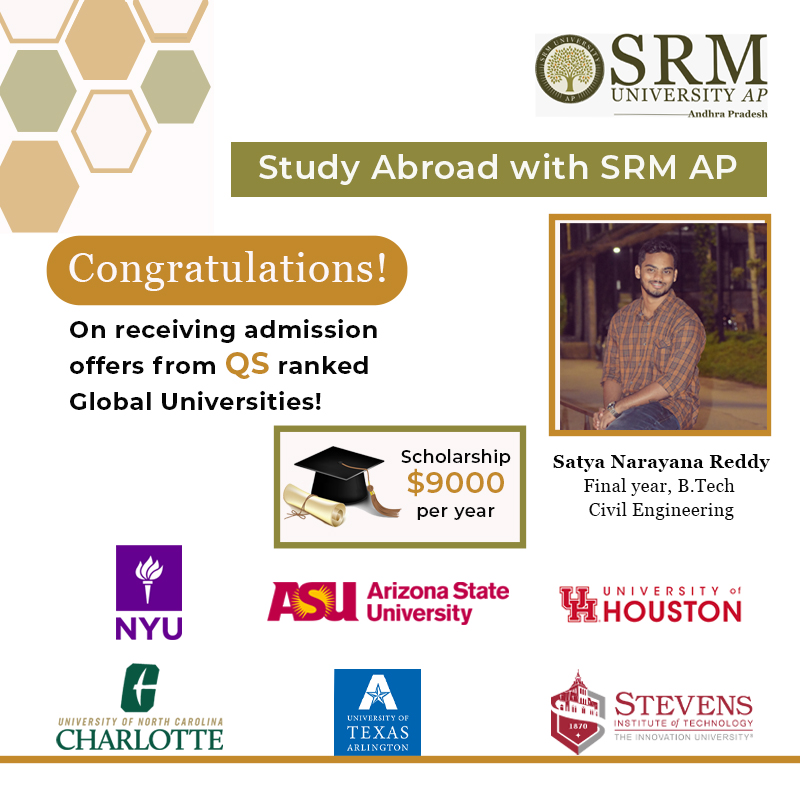 In recent years, the number of Indian students enrolling in colleges abroad has increased. The competition to secure a seat in a world-class university also increases with the number of students aspiring for higher education. The office of International Relations and Higher Studies at SRM University-AP ensures that our students are admitted to QS ranked universities, not just one but many. Satya Narayana Reddy Kovvuri, final year student from the Department of Civil Engineering has received admission offers from New York University, Stevens Institute of Technology, University of North Carolina Charlotte, University of Houston, Arizona State University, and the University of Texas Arlington.
In recent years, the number of Indian students enrolling in colleges abroad has increased. The competition to secure a seat in a world-class university also increases with the number of students aspiring for higher education. The office of International Relations and Higher Studies at SRM University-AP ensures that our students are admitted to QS ranked universities, not just one but many. Satya Narayana Reddy Kovvuri, final year student from the Department of Civil Engineering has received admission offers from New York University, Stevens Institute of Technology, University of North Carolina Charlotte, University of Houston, Arizona State University, and the University of Texas Arlington.
Read this exclusive interview with Satya Narayana and get inspired!
How do you feel about the admission offers and the scholarship?
I applied to 9 universities, and I was not confident about the admissions because of the high intake. The first university I got the offer from was Stevens institute of technology. Then I gained confidence that I could make it into my desired university. Later I was overwhelmed by the admits that I secured and even a scholarship to NYU. Among the 9 Universities I applied to, I received admission offers from Stevens Institute of Technology, University of North Carolina Charlotte, New York University, University of Houston, Arizona State University and the University of Texas Arlington. I’m also eagerly waiting to hear from Kent State University, Clemson University and the University of Washington.
Selection process of universities you are admitted to
The Selection process is almost the same for all the universities I applied to. After submitting the application, the documents go for the department (of the selected course) review, and the selection criteria will be based on:
- Good GRE and English Proficiency test score(IELTS/TOEFL/DUOLINGO)
- A good CGPA with no backlogs.
- An efficient SOP that describes your qualities, achievements and skills.
- Strong LORs from professors.
- Research Papers / Publications(if any)
Within two months, the universities will inform us of the decision and the details of the scholarship if we are qualified. I have received a scholarship of $9000 per year from New York University, which is ranked 42 in the QS global ranking.
About the course that you have decided to enrol in
The course that I have decided to pursue is an MS in Construction Management. As I am keenly interested in the construction sector and my bachelor’s degree is in Civil Engineering, I decided to gain more knowledge and experience in the same field. The opportunity to study Construction Management course is my dream come true.
Support from SRM AP (Faculty, mentors etc.)
Dr Uma Maheshwar Arepalli, Assistant Professor in the Department of Civil Engineering is specialised in Transportation Engineering. He provided me with a few insights about courses and the colleges which are suitable for my specialisation. It helped me clear my confusion while I was applying for universities. Dr Bhagath Singh, Head of the Civil Engineering department, also guided me in this process. I followed his instructions on how to apply to universities abroad. The Academic affairs department also helped me by providing transcripts and certificates as soon as I approached them so that there is no delay in my application process.
Your message to junior batches
I advise my juniors to start the process as early as possible. Score high in the GRE (310 -325) and IELTS (6.5 – 8)tests. Search for the universities that provide the best coursework for your desired branch. Also, keep in mind the states you choose in the US provide job opportunities after you complete graduation. Lastly, choose the better states by thinking about living expenses and weather conditions. Check for the requirements of your targetted universities beforehand and draft an excellent personal statement. Submit the applications before priority deadlines as it is crucial to secure scholarships. Check for regular updates in the mail and also in the university application portal.
- Published in CIVIL NEWS, Departmental News, International Relations, IR-News, News
SRMAP Scholar wins best oral presentation award in International Conference
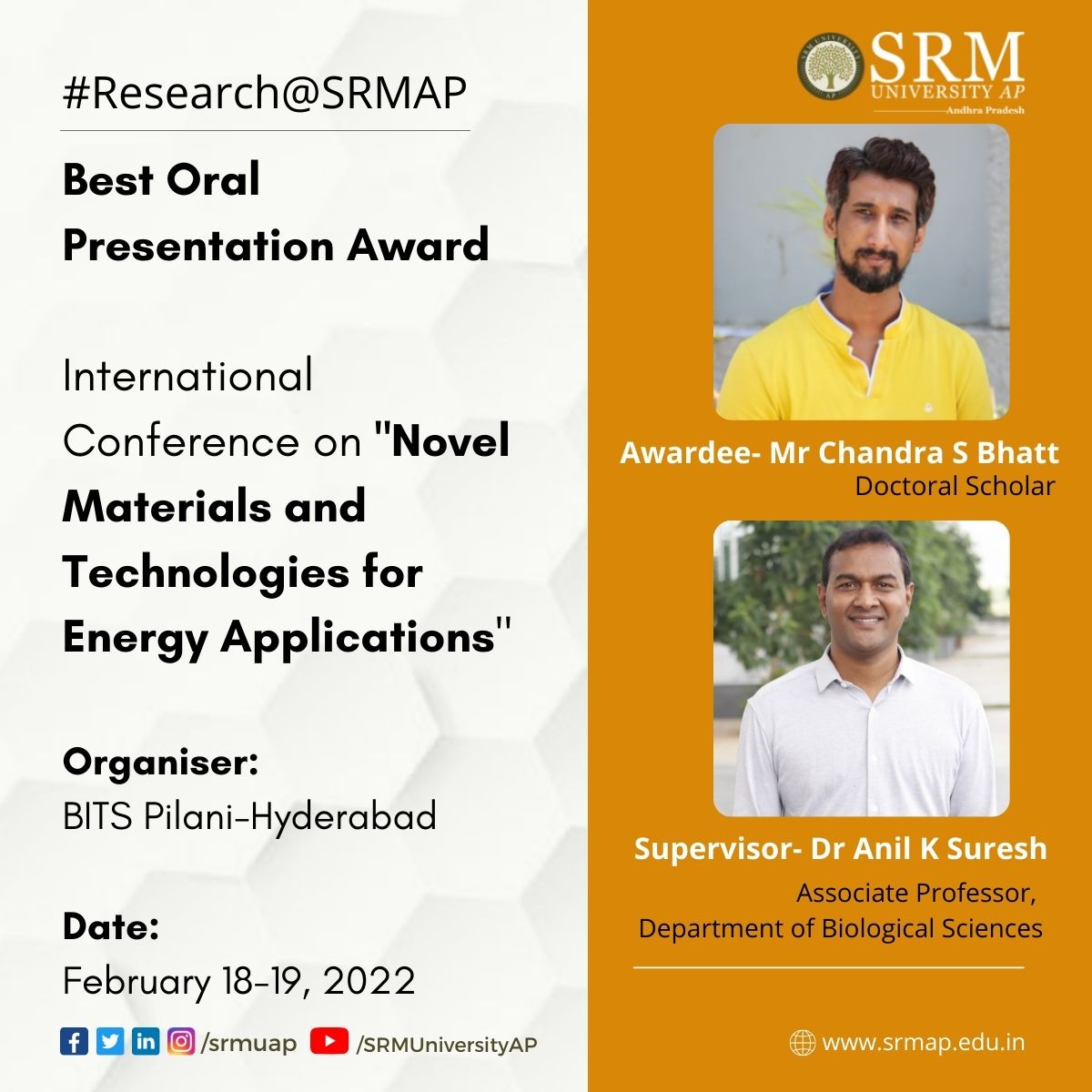 Mr Chandra S Bhatt, a PhD Scholar (CSIR-JRF) working under the guidance of Dr Anil K Suresh, Associate Professor, Department of Biological Sciences, has won the Best Oral Presentation Award at the International Conference on “Novel Materials and Technologies for Energy Applications,” organised by BITS Pilani-Hyderabad, on February 18-19, 2022. Prof Ashutosh Sharma, Former DST Secretary & Institute Chair Professor, IIT Kanpur, was the Chief Guest of the Conference.
Mr Chandra S Bhatt, a PhD Scholar (CSIR-JRF) working under the guidance of Dr Anil K Suresh, Associate Professor, Department of Biological Sciences, has won the Best Oral Presentation Award at the International Conference on “Novel Materials and Technologies for Energy Applications,” organised by BITS Pilani-Hyderabad, on February 18-19, 2022. Prof Ashutosh Sharma, Former DST Secretary & Institute Chair Professor, IIT Kanpur, was the Chief Guest of the Conference.
Abstract:
Mr Bhatt’s project aims to develop the best out of waste, which is practically demonstrated by synthesising gold nanostructured eggshell-based supported catalyst. Besides this novel strategy, the megacatalyst is implemented in the real-time degradations of organic and sewage dyes that are harmful to the environment and hydrogenation of nitroarenes at gram-scale (precursors for various pharmaceutical ingredients). Our rationale, naturally created, stable, reusable, hand-removable, resilient catalyst developed from left-over food waste trounces the majority of the existing challenges while utilising nano-based catalysts for heterogeneous catalysis.
With this innovation, Mr Bhatt aims to demonstrate pilot-scale (100-1000 litre) batch catalytic reactions for real-time textile sewage dye detoxification and gram scale hydrogenation of pharma-precursor for the production of acetaminophen, as a step of validation for immediate technology transfer and commercialisation for both environmental remediation and active pharmaceutical ingredients (API’s).
About the Author:
Mr Bhatt aims to continue his scientific career as a prominent scientist in the interdisciplinary area of nano-immunology for cancer theragnostics. Therefore, after the completion of his PhD, he wishes to advance his research career to contribute further to the realm of science upon postdoctoral training from a top-ranking institution abroad.
“It is indeed a moment of pride for me to be awarded the Best Oral Presentation Award in an International Conference organised by BITS Pilani, Hyderabad, winning over 30 participants across the Nation. I express my heartfelt gratitude to my supervisor Dr Anil K Suresh, for his guidance and motivation me throughout the journey,” said Mr Bhatt.
While expressing his joy, Dr Suresh emphatically said, “This was his first oral presentation in an International Conference, and he was conferred with the “Best Oral Presentation” Award. This recognition speaks for Chandra Sekhar’s dedication to his research. He has been working enthusiastically on this project, and I wish that the paper gets published in a high-impact journal which has already been communicated for Shekar’s bright scientific career.”
- Published in Biology News, News, Research News, Students Achievements
High-quality perovskite nanocrystals for light-emitting applications
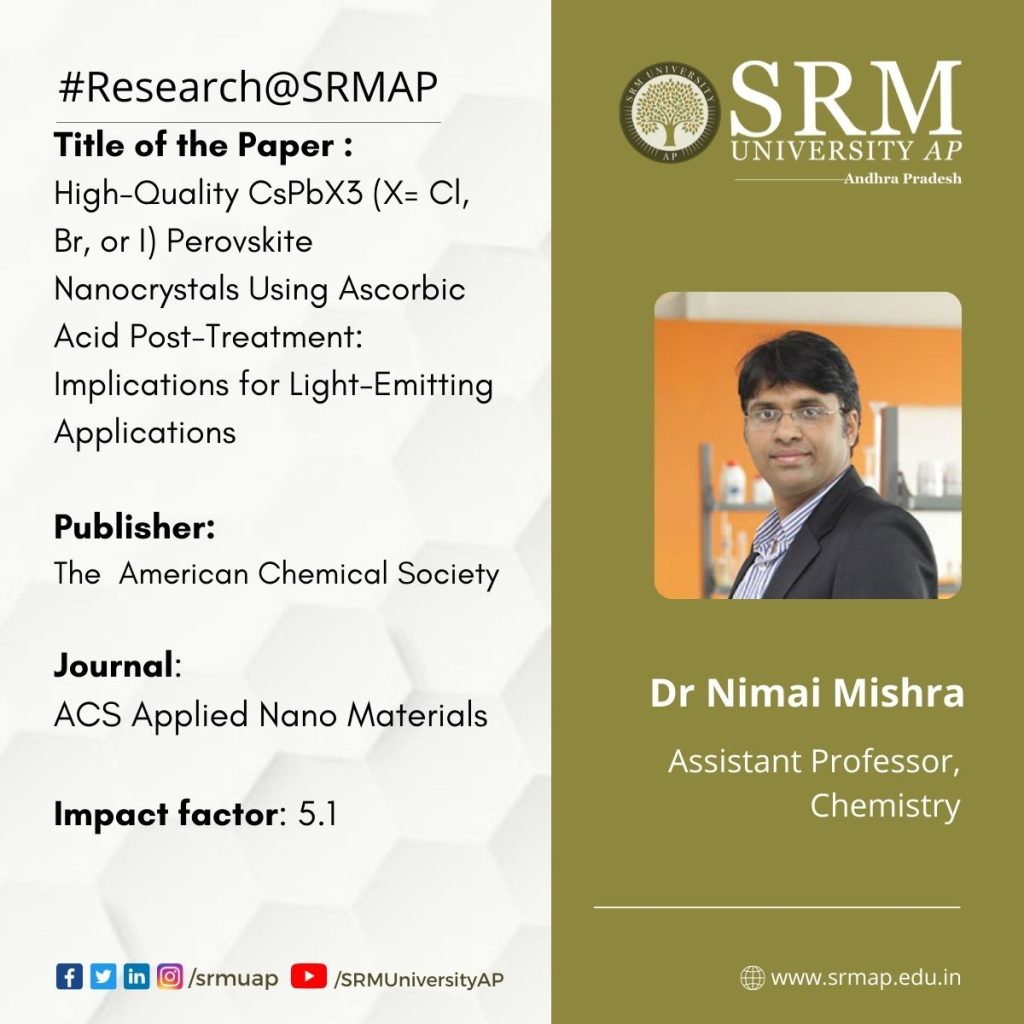 Dr Nimai Mishra, Assistant Professor, Department of Chemistry, SRM University-AP, Andhra Pradesh, along with his research group comprising of students pursuing PhD under his supervision, Ms VG Vasavi Dutt, Mr Syed Akhil, Mr Rahul Singh, and Mr Manoj Paalabathuni have published a research article titled “High-Quality CsPbX3 (X = Cl, Br, or I) Perovskite Nanocrystals Using Ascorbic Acid Post-Treatment: Implications for Light-Emitting Applications” in the Journal “ACS Applied Nano Materials” (published by The American Chemical Society) having an impact factor of ~5.1.
Dr Nimai Mishra, Assistant Professor, Department of Chemistry, SRM University-AP, Andhra Pradesh, along with his research group comprising of students pursuing PhD under his supervision, Ms VG Vasavi Dutt, Mr Syed Akhil, Mr Rahul Singh, and Mr Manoj Paalabathuni have published a research article titled “High-Quality CsPbX3 (X = Cl, Br, or I) Perovskite Nanocrystals Using Ascorbic Acid Post-Treatment: Implications for Light-Emitting Applications” in the Journal “ACS Applied Nano Materials” (published by The American Chemical Society) having an impact factor of ~5.1.
Abstract:
Cesium lead halide perovskite nanocrystals (CsPbX3 PNCs) have been the flourishing area of research in the field of photovoltaic and optoelectronic applications because of their excellent optical and electronic properties. However, they suffer from low stability and deterioration of photoluminescence (PL) properties post-synthesis. One of the ways to minimize the surface defects in the surface treatment with suitable ligands is to achieve the PNCs with superior PL properties for light-emitting applications.
In this article, Dr Mishra’s research group addressed the issue of stability in PNCs. We demonstrate to achieve high photoluminescence and stability of CsPbX3 PNCs by incorporating ascorbic acid via post-treatment as a new capping ligand that is abundantly available. Upon addition of ascorbic acid as surface passivation ligand into the oleic acid/oleylamine system to get near-unity photoluminescence quantum yield (PLQY) of CsPbBr3, CsPb(Br/I)3, and for CsPbI3 perovskite NCs. Maintaining stability has become the hotspot of research in this field. Hence, as-a-proof of concept, the stability studies of PNCs in ambient conditions, under continuous UV irradiation, and PL with temperature variations are put forth here. The stability enhancement with post-treatment of ascorbic acid is highly reproducible as we tested for four batches of samples.
Despite the significant advancements of PNCs, there is a challenge afflicting the stability of CsPbI3 PNCs. They are thermodynamically unstable and undergo a non-perovskite phase (δ-phase) transition at room temperature. Many efforts have been reported in the stabilization of iodide perovskite NCs by critically passivating PNCs and applying them for optoelectronics and photovoltaics. On the other hand, mixed halide perovskites like CsPbBrI2 which are relatively stable than CsPbI3 PNCs are a better choice for device applications. But, photo-induced halide segregation is unavoidable which in turn again limit their usage in practical applications. In this manuscript, we demonstrated that the ultra-stable iodide-based PNCs can be achieved by simple and facile surface treatment with ascorbic acid.
The PL intensity of untreated and ascorbic acid-treated PNCs is recorded for 42 days since the date of synthesis. The measurements are carried out for 4 different batches of samples to ensure reproducibility. It is found that the PL intensity is deteriorating rapidly for untreated PNCs while the PL intensity is largely maintained for ascorbic acid treated PNCs. Nearly ̴72% of the initial PL intensity is maintained even after 42 days for the ascorbic acid-treated CsPbBr3 PNCs while the PL intensity is dropped to 24% for untreated PNCs. Ascorbic acid treated CsPbBrI2 PNCs exhibited exceptional ambient stability where ̴69% of the initial PL intensity is maintained after 42 days while the PL of untreated CsPbBrI2 PNCs is degraded rapidly within 2 weeks from the date of synthesis. Moreover, the PL stability of CsPbI3 PNCs is high for ascorbic acid-treated samples even after 55 days while the PL has deteriorated within 4 days for untreated CsPbI3 PNCs. The PL of untreated CsPbI3 PNCs is completely lost in the first 4 hours of UV illumination while ̴ 76.7% remnant PL is observed for ascorbic acid-treated CsPbI3 PNCs. We believe the stabilization of CsPbX3 PNCs of different halide compositions via simple surface treatment with ascorbic acid could form a basis for futuristic light-emitting applications.
Read the full paper: https://pubs.acs.org/doi/full/10.1021/acsanm.1c04312
- Published in Chemistry-news, News, Research News
An incredible feat of Mechanical Engineering student
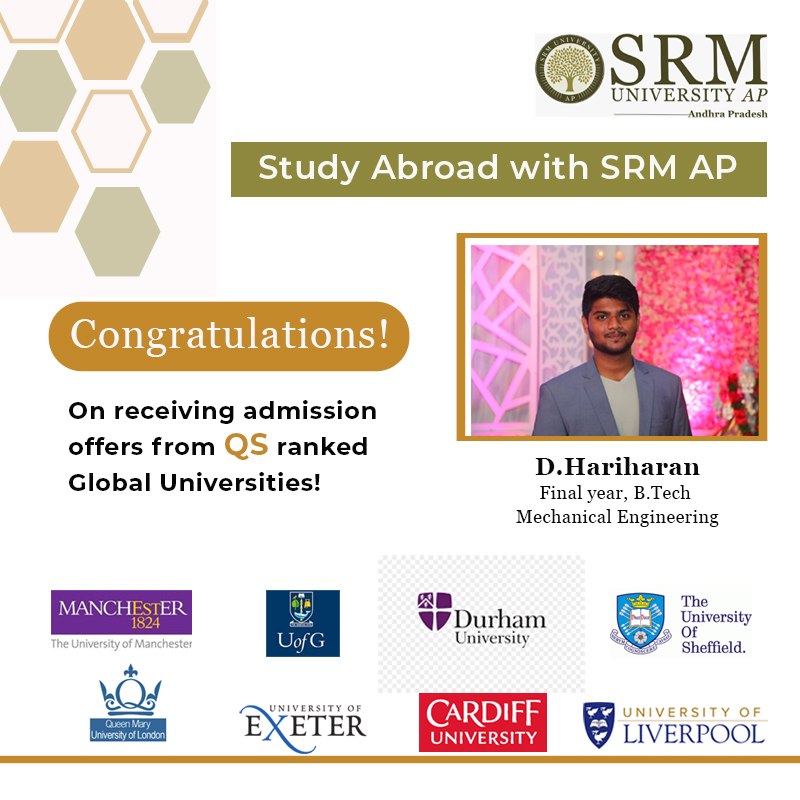
It is a moment of pride and celebration for the Department of Mechanical Engineering at SRM University-AP as Hariharan D, Final year, BTech Mechanical Engineering bags admission offers from multiple top-ranked overseas universities including the University of Manchester that ranks 27 in the QS World University Rankings.
Moulding up the students through the right training and plotting out the right pathway for them to scale further heights have always been the primary objective of the faculty of SRM University-AP. “Happy to hear that you got placed in a core dream company. I hope this will not dampen your aspirations to go for higher studies. Indeed, students like you should study as far as you can. You should bring more laurels to this institution and make us proud”, this was the message Hariharan received from his faculty mentor, Dr Pramod Jammy, which kindled his spirit to set off for higher studies abroad.
“I am ever grateful to my beloved faculty mentors, Dr Pramod Jammy, Dr Lakshmi Sirisha and Dr Surfaraz Halkarni, for their constant support, inspiration and Letter of Recommendations provided amidst their busy schedules. I also thank my Department Head, Dr Prakash Jadhav, for his continuous motivation”, remarked Hariharan.
According to him, creating an imposing CV and impactful SoP is the deciding factor of the application process. He expressed his gratitude to the entire department for their effective involvement in every bit of the application process. “To build an attractive SoP and resounding CV, we need credentials like decent CGPA, involvement in departmental activities such as webinars, internships, workshops, minor projects, software skills, etc. Also, the close association with the department faculties right from the first year is essential to get their affinity and the commendable Letter of Recommendations” he added.
Forging a conducive platform to actualize one’s potential and chase after the life of one’s dreams is what makes SRM University-AP the topmost priority of students. Hariharan has set out an ideal example for many to follow and believe in their dreams coming true with SRM University- AP.
A Wearable Face Shield: Pioneering engineering invention
The Department of Electronics and Communication Engineering is proud to announce the remarkable achievement of the students Chebrolu Taraka Sai Tanishq and Vellampalli Medha V Subrahmanya Aditya. They have designed a wearable face shield and secured the second position in IEEE Covigilance, 2021 – A pan India student contest based on Covid-19 relief do it yourself equipment design and development, under the guidance of Dr Anirban Ghosh, and got a patent published for their prototype developed as part of the competition. The team also participated in the 4th Research Day organized by SRM University-AP and received a gold medal.
The prototype was submitted in the design competition on July 30, 2021, and after 40 days of rigorous brainstorming, component procurement and prototype development, the final model was submitted for evaluation. Based on prototype execution, feasibility of manufacturing and suitability of the model to contain the spread of the pandemic, the team secured second place in the Pan India contest, and it was deemed fit to address the two criteria; innovation challenges like Innovation of homemade masks/shields/PPEs and innovation of a feasible solution to control covid-19 spread while the schools and colleges are reopening. Further, this prototype was submitted to the patent office under the name “A Wearable Face Shield” (Application no:202241000990) and the patent was published on January 21, 2022.
Their accomplishment bears testimony to the fact that unflinching determination towards your goals and consistent efforts to make them come true will always pay off. Designing a wearable face shield is a well-timed innovation as the pandemic shows no sign of retreat and face shield has become one of the daily necessities of all mankind.
About the Prototype
The wearable face shield is a medical protective device, and it comprises a frame for securing the shield to the head of a wearer, a transparent sheet extending from the frame, a detection circuit that is mounted on the frame, a switch, and a battery module. The detection circuit comprises of a control unit that processes the sensed data received from proximity and temperature sensors to generate output signals and an alerting unit that comprises LEDs, buzzer and it provides an indication of– (i) the presence of a detected external object within a pre-determined distance of the wearer (ii) the sensed body temperature of the wearer. The alerting unit is placed strategically to alert people via visual and audio signals respectively.
Such precautionary detection and proximity alert prototype can prove instrumental in early diagnosis and isolation aiding in crowd management and free movement in places of social gathering. Hence, a wearable face shield ensures adequate separation between persons and facilitates temperature monitoring and early detection of disease.
They are currently working on a project called “Human Monitoring System” (HUM). It is an all-pervasive system designed to measure and keep track of the heartbeat, blood pleasure, temperature, location, Spo2 level etc of the user. In the event of an emergency or critical drop in any of the vitals, the system can automatically alert the local hospital, ambulance service and relatives.
- Published in ECE NEWS, Faculty Achievements, News, Research News, Students Achievements
Introducing decentralized security system using blockchain technology
The Department of Computer Science and Engineering is delighted to announce that Dr Rajiv Senapati and his research group; Abhiram Chakravadhanula, Jaswanth Kolisetty, Karthik Samudrala and Bharat Preetham have published a research article titled “A Novel Decentralized Security Architecture for the Centralized Storage System in Hadoop using Blockchain Technology” in the Scopus indexed IEEE 7th I2CT (The premier conference for the latest discoveries in Convergence in Technology in Asia Pacific).
Over the past decades, the Big Data ecosystem is experiencing a humungous explosion in the generation and exchange of information. Trading such delicate information can serve as a profitable knowledge resource in the present economy. However, serious concerns have been raised about the security and assurance of delicate data as the conventional safety architecture in centralized storage systems does not meet its nuanced requirements. Blockchain technology offers a promising solution for big data protection due to its decentralized nature. Through this research article, Dr Rajiv Senapati and his students intend to introduce a decentralized security architecture in centralized storage systems such as Hadoop to address its existing vulnerabilities.
Abstract of the Research
Big Data is huge in volume, diverse in information, and growing at flourishing rates. The major distributed file systems in the current market in Big Data Analysis include Apache Hadoop, Storm, Cassandra, Flink, Cloudera, and many more. Hadoop is an open-source framework divided into Hadoop Distributed File System (HDFS) and Map-Reduce. Hadoop plays a leading role in storing and processing Big Data in contemporary society as it is cost-effective and can manage large volumes of data in low-cost commodity hardware. HDFS is a type of Data Warehouse which is scalable and has fast access to information.
Metadata is the information about the data, such as which block is storing on what datanode, how many replications that block has, and on which datanodes those replications reside. In HDFS, this metadata is stored at a fixed place in namenode, and attackers can access the metadata and modify it without notice. Also, metadata is mutable, which means the attacker can erase his presence easily.
In this paper, to resolve this issue, we have provided a mechanism using blockchain technology that follows a decentralized architecture against the centralized architecture followed by HDFS. Hyperledger Fabric (HLF) is the blockchain proposed to be effective and trusted for such a purpose. HLF is a private blockchain with a distributed immutable ledger. The metadata will be stored in the ledger. If an attacker tries to modify the data, he cannot erase his presence as the ledger is immutable, unlike HDFS. Further, the work proposed in this paper can be extended in real-time HDFS with a secure ledger and multiple nodes.
- Published in CSE NEWS, Departmental News, News, Research News
Journey of civil engineering students to New York University
By earning a ticket to NYU Tandon School of Engineering for the Master’s programme, Students of Civil Engineering; Jayaram Chowdary Dasari, S Yogendra Gopinath and Leela Sujan Sai Borra have added one more feather in the department’s cap. It is a matter of joy and pride for the Department of Civil Engineering and the university as more and more students are getting admitted to international universities. Harnessing the true potential of each student and preparing them for a bigger world have always been the primary focus of SRM University-AP.
They are groomed from a very early stage to reflect on their educational objectives and initiate the appropriate action. “I had started my preparation way ahead and cleared the GRE and IELTS tests, then I consulted my Professors Dr Bhagath sir, Dr Narasimha Murthy sir and Dr Uma Maheswar Rao sir for guidance and with their help, I shortlisted the universities and the best programmes which can fulfil my future goals,” said Yogendra.
“We will never forget our faculty members for their immense support in helping us find the right universities, and also for the initiatives taken by the department such as conducting webinars to educate students about the application procedure for higher studies.” Borra and Jayaram also marked their gratitude to the department.
The Office of International Relations at the university has also played a crucial part in their achievement as it walked them through the right procedures for an overseas application. “I shall forever be thankful to Dr Shweta ma’am for her valuable guidance on drafting an incredible SoP” added Yogendra.
An enriching learning environment with exposure to global educational practices rendered at SRM University-AP will foster the right academic spirit in students and enable them to move ahead with better clarity of purpose. Also, training imparted by the expert faculty will help them gather deeper insights and transform themselves into professionals in their respective fields.
- Published in CIVIL NEWS, Departmental News, International Relations, IR-News, News, Students Achievements
Sikindhar Jaladi represents Andhra Pradesh in National Youth Parliament Festival 2022
The youngest National level participant of the year
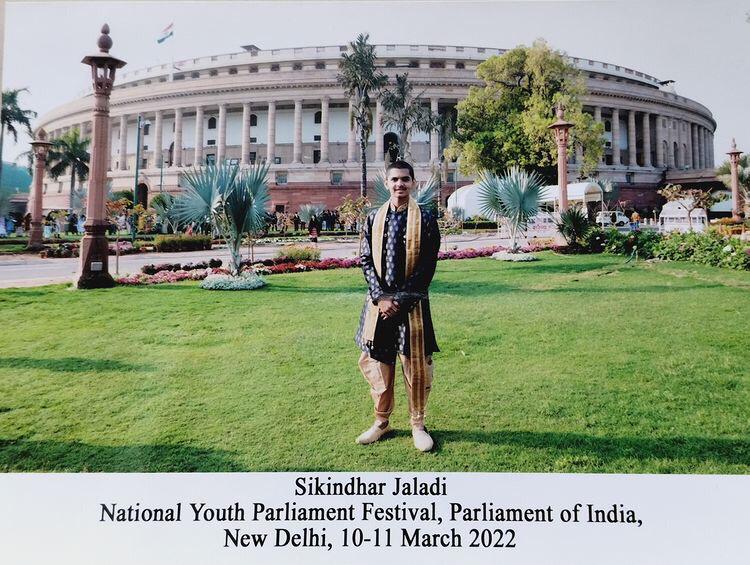 The national youth parliament initiative intends to strengthen the roots of democracy among India’s youth population. Sikindhar Jaladi, a first-year BTech Computer Science student at SRM University-AP, won district and state level elocution competitions and participated in the National Youth Parliament Festival 2022 conducted by the Ministry of Youth Affairs and Sports, Government of India.
The national youth parliament initiative intends to strengthen the roots of democracy among India’s youth population. Sikindhar Jaladi, a first-year BTech Computer Science student at SRM University-AP, won district and state level elocution competitions and participated in the National Youth Parliament Festival 2022 conducted by the Ministry of Youth Affairs and Sports, Government of India.
Mr Sikindhar bagged first place in the district level elocution competition in the District Youth Parliament in Krishna District on February 19, 2022, wherein he talked on the topic of Digital India. The top 2 participants from all districts of Andhra Pradesh competed at the state level, and Mr Sikindhar proved his mettle again, securing first place in elocution on the topic Startup India, Standup India.
Across India, approximately 2,40,000 ( two lac forty thousand) people have competed on all levels. In that, only 87 (3 from each state, 29*3=87) of them were shortlisted to attend the national level. Out of which only 29 (1st place winners from each state) of them availed a chance to speak at the Parliament. Being the 1st place winner from Andhra Pradesh, Mr Sikindhar represented the state and delivered his speech in the Parliament House (Sansad Bhavan) in front of the Honourable Speaker, Cabinet Ministers of the central Government, Entrepreneurs and other Dignitaries.
National Youth Parliament Festival (NYPF) is a national level competition organised by the Union Ministry of Youth Affairs and Sports in partnership with the Nehru Yuva Kendra Sangathan since 2019. (NYKS).
Read this exclusive interview with Mr Sikindhar on his journey to Indian Parliament House
“I am delighted to have got the opportunity to speak at Parliament, which is the highest forum of discussion and debate on public issues and national policy”, says Mr Sikindhar. “Also, I was the youngest youth parliamentarian aged 18 among all the participants”, he added joyfully.
Preparation for the State Level Elocution Competition
The topics were released one day before the state-level competition. Having a dream to become an entrepreneur, I chose Start-up India-Stand-up India among the given topics. I know how the start-up ecosystem has been growing in India and the sectors in which the Indian start-ups are emerging. On an important note, I would like to thank SRM University-AP for providing an entrepreneurship cell( Ecell) that solely focuses on starting up and inculcates leadership and entrepreneurial qualities in young minds. I would also thank our director of entrepreneurship cell Udayan Bakshi sir. I’m a member of the SRM Ecell at the Industree Owl, which helped me get acquainted with some startup and business terminologies.
Experience at SRM AP
Being a fresher, I like the experience here at SRM AP. I have good friends from all over the country. Those from the North Indian states like Haryana, Uttar Pradesh, West Bengal and Bihar help me gradually learn Hindi. And that knowledge of Hindi helped me highlight some points of my speech in Hindi, which made my address more attractive. Suman Kumar from Bihar, my classmate and CSE project partner at SRM AP, helped in preparing my speech. Hopefully, I will enjoy and experience the fullest from the university once the university reopens for onsite classes.
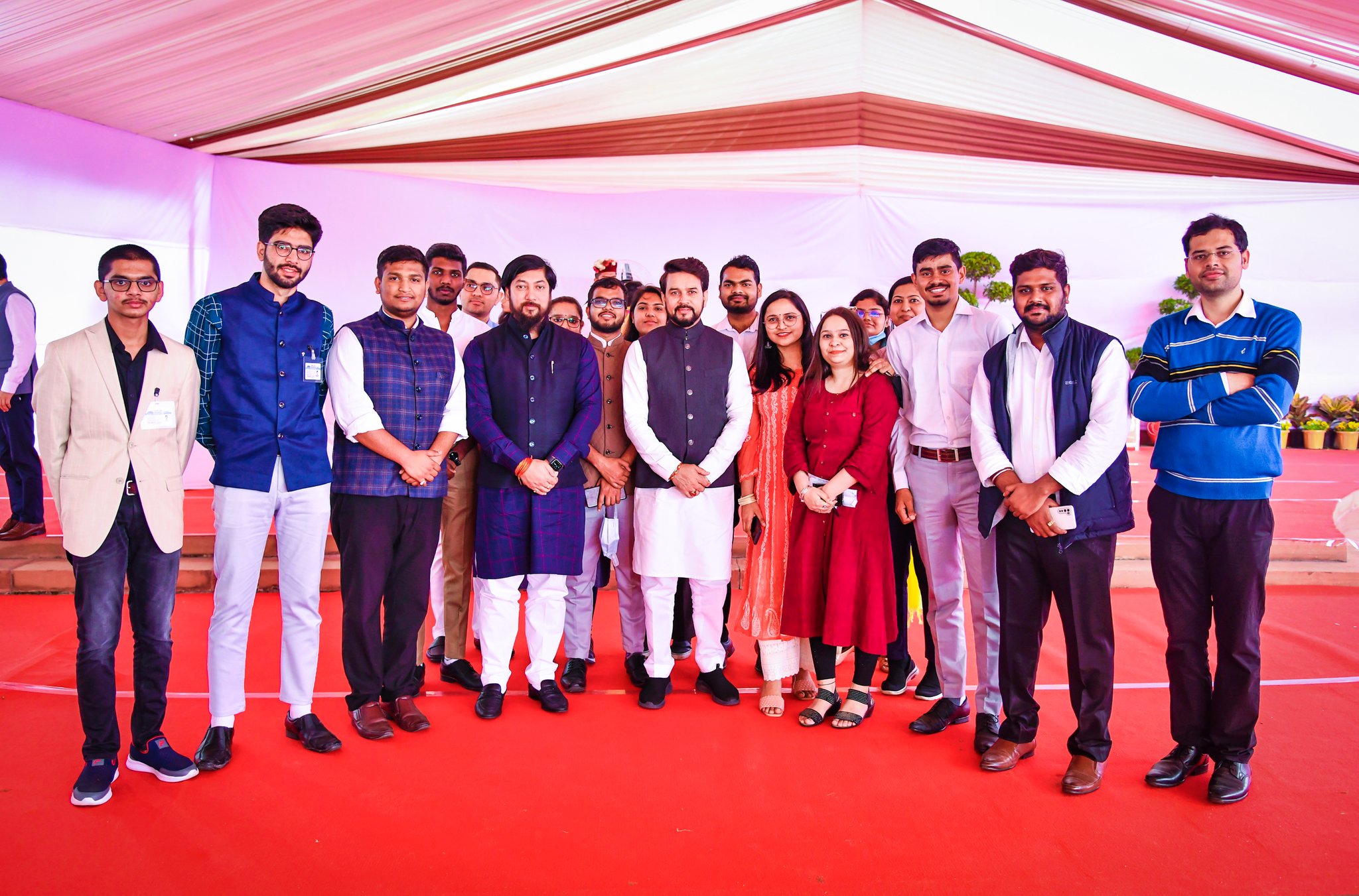
About the National Level Elocution competition in Delhi
The experience at the national level competition was truly unique. Best speakers from all the states were competing there. Though I was a bit anxious, I’m happy that I learned many things. Among all the speakers and participants, I was the youngest one. I loved the whole trip and made a lot of connections and friends. I met Shri Om Birla– Hon’ble Speaker of Lok Sabha, Shri Anurag Singh Thakur– Hon’ble Minister of Youth Affairs and Sports, Shri Nisith Pramanik– Hon’ble Minister of State, Youth Affairs & Sports. We had a beautiful conversation with the honourable union ministers Anurag Singh Thakur and Nisith Pramanik about the problems faced by the people of India, responsibilities and fundamental duties of the youth and the people of India in policymaking. I would also like to share that I had a chance to have dinner with the honourable Union Minister Shri Nisith Pramanik on March 10th evening. We also experienced a beautiful cultural event with the union ministers and members of Parliament (MPs).
Support received from SRM AP
Definitely, SRM AP played a crucial role in the journey. When the state level results were announced, our beloved Vice Chancellor sir, Pro-Vice-chancellor sir, Dean SEAS Prof B V Babu sir, Student Affairs Assistant-Director Revathi ma’am, ITKM Associate Director Arundhati ma’am, ITKM department, management, faculty members, and friends encouraged and motivated me. As I mentioned earlier, I would like to thank SRM University for providing an entrepreneurship cell (Ecell) that solely focuses on starting up and teaches leadership and entrepreneurial qualities in young minds. I’m a member of the SRM Ecell at the Industree Owl department, which helped me get acquainted with some startup and business terminologies.
- Published in CSE NEWS, Departmental News, News
Innovatory conversion of bagasse to biogas
The Department of Environmental Science is glad to announce that Dr Lakhveer Singh has published a paper titled “Anaerobic digestion of sugarcane bagasse for biogas production and digestate valorization” in the journal ‘Chemosphere’ having an impact factor of 7.08 in collaboration with IIT Delhi.
Abstract of the Research
The complex structure of biomass is recalcitrant to degradation and is a major hindrance for anaerobic digestion, so different pre-treatment methods are applied to deconstruct the bagasse for microbial digestion. In this review, different processes developed for the pre-treatment of bagasse and their effect on biogas production have been extensively covered. Moreover, combinations of pre-treatment methods, co-digestion of bagasse with other waste (nitrogen-rich or easily digestible) for enhanced biogas production and biomethane generation along with other value-added products have also been reviewed. Thus, this review highlights the major emerging area of research for improvement in bagasse-based processes for enhanced biogas production along with digestate valorization to make the overall process economical and sustainable.
The paper offers a promising solution with respect to the conversion of agricultural waste to biomethane along with other value-added products. As far as Dr Singh is concerned, future research should also be directed towards the life cycle assessment of different integrated technologies for quantifying the environmental and economic benefits which will help to choose the most sustainable option for digestate valorization.
- Published in Departmental News, ENVS News, News, Research News
A novel method of synthesising 2D transition metal oxide layers
Patent application No: 202241005220
Publication date: 11/02/2022
Title: Two-Dimensional Transition Metal Oxide Layers and a method for their Synthesis
Inventors: Dr. Jatis Kumar Dash, Shaik Md. Abzal, Kurapati Kalyan, Sai Lakshmi Janga
Department of Physics, SRM-University-AP, Andhra Pradesh
The Department of Physics is glad to announce that Dr Jatis Kumar Dash and his PhD Scholars Shaik Md. Abzal, Kurapati Kalyan and Sai Lakshmi Janga have got their patent “TWO-DIMENSIONAL TRANSITION METAL OXIDE LAYERS AND A METHOD FOR THEIR SYNTHESIS” published on February 11, 2022.
About the Patent
Extensive use of portable electronic products and the rapidly growing commercial markets in smart electric appliances have created a seemingly high demand for flexible, wearable high-performance photoelectric devices and energy storage technology. In the search for new materials to meet these criteria, one promising solution may be the two-dimensional (2D) material heterostructures, assembled by stacking different conventional 2D materials (for example, graphene, transition metal oxides, carbides, and chalcogenides) in hetero-layered architectures.
These 2D materials stackings are ultrathin layered crystals that show unusual physicochemical properties at few-atom thickness. These 2D heterostructures offer several key advantages for the next-generation devices such as (i) atomically thin 2D nanosheets provide a larger surface area due to complete exposure of the surface atoms, (ii) the edge sites in 2D nanosheets are chemically more reactive than their basal planes and the open gaps enable the intercalation of electrolyte ions and (iii) the high mechanical strength and flexibility at atomic dimensions allow them to be used in the next-generation wearable electronics.
But the growth and stacking of 2D materials is always a challenge. Also, the existing growth tools are complex and expensive. Here, at SRM University-AP, we have fabricated the large-area ultra-thin 2D transition metal oxide (TMO) layers using an easy and cost-effective method. In addition, these 2D TMO layers are further integrated to different other 2D materials for their use in nano-electronic devices. Our work shows the great potential of ultra-thin TMOs in 2D-material-based flexible electronics.
Social Implication
2D materials are the prime candidates for making flexible, wearable, foldable and transparent self-powered smart electronic devices. The next-generation smart electronic devices will be made of 2D materials heterostructures which will need less operating power, less consumption of materials and will have ultimate scalability.
The team is also in the process of optimization and aims to make prototype flexible 2D supercapacitors, photodetectors, ultrathin transistors, and various sensors.
- Published in Departmental News, News, Physics News, Research News


